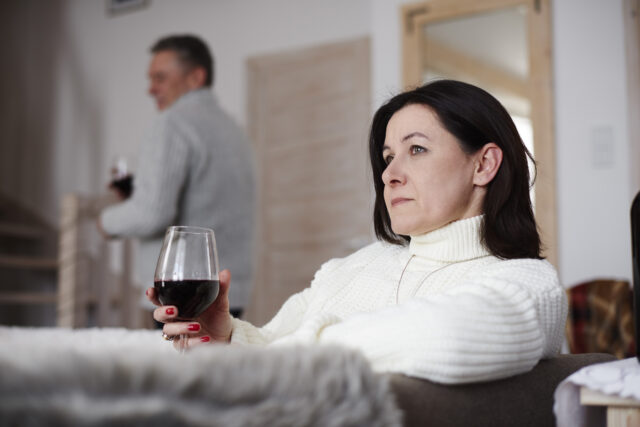Why is it that most women tend to feel guilty for setting boundaries or turning down requests, even when it’s absolutely reasonable?

It’s hard to understand where this guilt comes from, especially when saying “no” is sometimes the best, healthiest choice. Nevertheless, so many of us still struggle with putting ourselves first more often than not. Here a few possible explanations for why that happens to us.
1. We don’t want to disappoint anyone.

For many women, disappointing someone feels almost unbearable. There’s a deep-seated worry about letting people down or not meeting their expectations, especially with loved ones. Saying “no” can bring up fears of hurting people’s feelings or seeming unhelpful. But learning to look after yourself is just as valuable as showing up for everyone else.
2. We worry we’ll be seen as selfish.

Society often paints selflessness as a virtue, especially for women, which makes setting boundaries feel selfish. The idea of focusing on personal needs can create a sense of guilt, as if you’re putting yourself above other people. But saying “no” doesn’t mean you’re selfish; it means you respect your own limits.
3. We feel responsible for everyone’s happiness.

Women are often expected to be caretakers and supporters, which can lead to feeling responsible for other people’s emotions. Turning someone down may feel like you’re letting them down or causing disappointment. Remember, though, that you’re not responsible for everyone’s happiness—only your own.
4. We feel pressure to be seen as a “good” person.

Many of us grow up with the idea that being a “good” person means always saying “yes” and helping out. Saying “no” can feel like it goes against this ingrained belief, making it hard to stick to boundaries. Realising that being “good” includes respecting your own needs can be freeing.
5. We’re scared of conflict or confrontation.

For some, saying “no” feels like it invites conflict, which can be uncomfortable or even anxiety-inducing. The desire to keep peace can lead to saying “yes” when you don’t want to, just to avoid potential tension. Practising “no” calmly can help you navigate these moments with confidence and less stress.
6. We feel like it’s easier to just agree.

Sometimes, it feels like saying “yes” is the quickest way to move on. Saying “no” can require explaining yourself or facing someone’s reaction, which can feel exhausting. But agreeing to things you don’t want to do only leads to burnout over time. Learning to say “no” with simplicity can keep things honest and direct.
7. We’re wary of damaging relationships.

Saying “no” can feel like it risks the relationship, especially if you’re unsure how the other person will react. Worrying that a friend or family member will feel hurt or disconnected is common. But strong relationships are built on mutual respect, and that includes respecting each other’s boundaries.
8. We’ve internalised expectations to “do it all.”

There’s often a belief that women should juggle everything—work, family, friendships, and more. This “do it all” mentality can make it feel wrong to say “no” or admit that you have limits. Letting go of this expectation allows you to focus on what truly matters to you.
9. We have a fear of missing out on opportunities.

Saying “no” sometimes feels like you’re closing the door on a potential opportunity or experience. This fear of missing out can push you to take on more than you can handle. But being selective with your time lets you focus on the things that genuinely matter to you.
10. We want to be liked and accepted.

It’s natural to want to be liked, and sometimes that means saying “yes” to fit in or avoid rejection. For many women, declining can feel like risking social acceptance or approval. But true connection doesn’t rely on saying “yes” all the time; it comes from being genuine.
11. We feel pressured to always appear strong and capable.

Many women feel like we must always appear strong and capable, which makes it hard to admit when we need a break. Saying “no” can feel like admitting weakness, which feels uncomfortable. But recognising and respecting your own limits shows real strength.
12. We’ve had people react badly to “no” in the past.

If you’ve ever been met with anger or disappointment after saying “no,” it’s natural to want to avoid that feeling. These experiences can create lasting anxiety about setting boundaries in the future. Remembering that “no” is valid, no matter the reaction, can help you feel empowered.
13. We feel like we owe people our time.

Many women feel we “owe” their time or energy to family, friends, or colleagues. Having such a strong sense of duty makes it tough to say “no” without guilt. Recognising that your time is valuable and yours to give freely helps shift this perspective.
14. We don’t want to be seen as ungrateful.

Sometimes, women feel guilty saying “no” because it might come across as ungrateful, especially if we’ve got help or favours from people. It’s a concern that can make it hard to set boundaries. Appreciating people doesn’t mean you have to say “yes” to everything they ask.
15. We don’t have enough practise saying “no.”

For some, saying “no” is simply unfamiliar territory. If you’re used to always agreeing, it can feel uncomfortable to start setting boundaries. Practising “no” in small ways can make it easier over time and build your confidence.
16. We feel bad for prioritising our own needs.

Many women feel guilty putting their needs first, as though it takes something away from other people. This guilt can be deeply ingrained, making it difficult to make choices that serve you best. Recognising that self-care benefits both you and those around you can ease this guilt.




